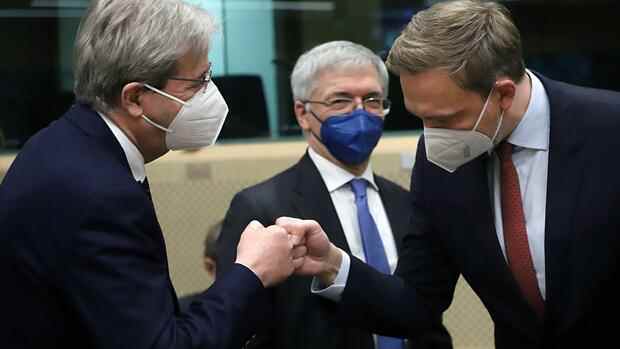Berlin/Brussels Christian Lindner (FDP) is not the only newcomer. In addition to the Federal Minister of Finance, his colleagues from the Netherlands, Luxembourg and Austria will also take part in the Eurogroup meeting for the first time on Monday in Brussels. And the meeting of the larger group of EU finance ministers on Tuesday is a premiere for eight of the politicians present.
A long-time EU diplomat says he cannot remember a comparable change in personnel. Accordingly, the meeting is about an attempt to sort oneself out politically. The focus of attention is the German treasurer.
How will Lindner position itself when it comes to the thorny issues of the coming months? Does he insist on stability and frugality, as he did as FDP leader during the election campaign, or does he act as a mediator who is willing to compromise?
Finance ministers will soon have to decide how to get hold of the hundreds of billions of euros to be invested in the green transformation. Converting the continent to climate-neutral would overwhelm the budgets of many countries. There are two proposals on the table.
Top jobs of the day
Find the best jobs now and
be notified by email.
Two suggestions for more debt
Proposal one is to relax the common debt rules of the euro countries. A reform seems inevitable to many, since the rules were hardly followed even before they were largely overridden due to the corona crisis. New borrowing must not exceed 3 percent of GDP and total debt must not exceed 60 percent of GDP.
In fact, the average rate is 98 percent, and in some countries it is more than double the target. According to the current resolution, these requirements would apply again from January 2023.
There should be a successor plan by the end of 2022. Italy and France are calling for future investments to be exempted from the requirements. In this way, the problem of debt criteria and investments in green technologies could be solved at the same time.
The second proposal is to set up a fund for the green transformation, for which the EU states jointly take on debt. The Corona reconstruction fund would be a model. The EU countries present investment programs and then receive money for them in tranches.
Lindner knows that both proposals are controversial domestically because they mean that Germany has to share the risks of other countries. The FDP is one of the critics, the SPD and the Greens are more open. The Federal Minister of Finance must forge a compromise in Brussels that the traffic light partners will support without overburdening his party.
The Union puts pressure: “No debt union”
The Union knows about Lindner’s needs and is already putting pressure on him. The Bavarian finance minister Albert Füracker (CSU) and the Europe minister Melanie Huml (CSU) have sent the finance minister a letter with a warning: “Steps towards a debt union” should not be allowed.
The federal government should “clearly reject” such considerations, they write. “Responsibility must be clearly distributed and the course must be set for a return to Maastricht-compliant budgets. A softening of the European fiscal rules is the wrong way.”
Since taking office, Lindner has not yet taken a clear position on the reform of the Stability Pact. The federal government is open to progress and further development, Lindner said before the meeting in Brussels, but fundamental changes to the stability pact are neither expected nor necessary.
An increase in the debt ceiling of 60 percent, as proposed by France and the euro rescue fund ESM, among others, should therefore not exist. A change in the complicated specifications for debt reduction – such as the question of how quickly the 60 percent should be reached again – is negotiable.
Spokesman for the thrifty or mediating moderator?
In the European capitals, people are particularly curious about the role Lindner will play in the talks. During the euro crisis, then Federal Finance Minister Wolfgang Schäuble (CDU) was something of the leader of the financially conservative states.
His successor and current Chancellor Olaf Scholz (SPD), on the other hand, saw himself more as a moderator who mediated between the concerns of the southern and northern European countries. As a result, the Dutch, in particular, took on the role of financial policy admonishers with the group of the “Frugal Four”.
Dutch finance minister Sigrid Kaag, who belongs to the left-liberal D66 party and is also making her debut in the Eurogroup, may not be able to take on that role again. The new Austrian treasurer Magnus Brunner (ÖVP) jumps in before his premiere in Brussels and announces that he wants to forge a coalition of northern countries against the mutualization of debt. “I want to explore whether we can form a group of ‘states of responsibility’ whose goal is to return to the path of more sustainable financial policy in the medium term,” Brunner told the FAZ.
The Austrian finance minister would like Germany to be an ally in the group. So far, however, Lindner has not shown any interest in membership.
The Federal Ministry of Finance is currently emphasizing that the formation of blocs among the European finance ministers has been overcome. Accordingly, Lindner should position himself cautiously and reservedly at his premiere in Brussels.
More: Comment: The future of the euro does not depend on rigid debt limits
